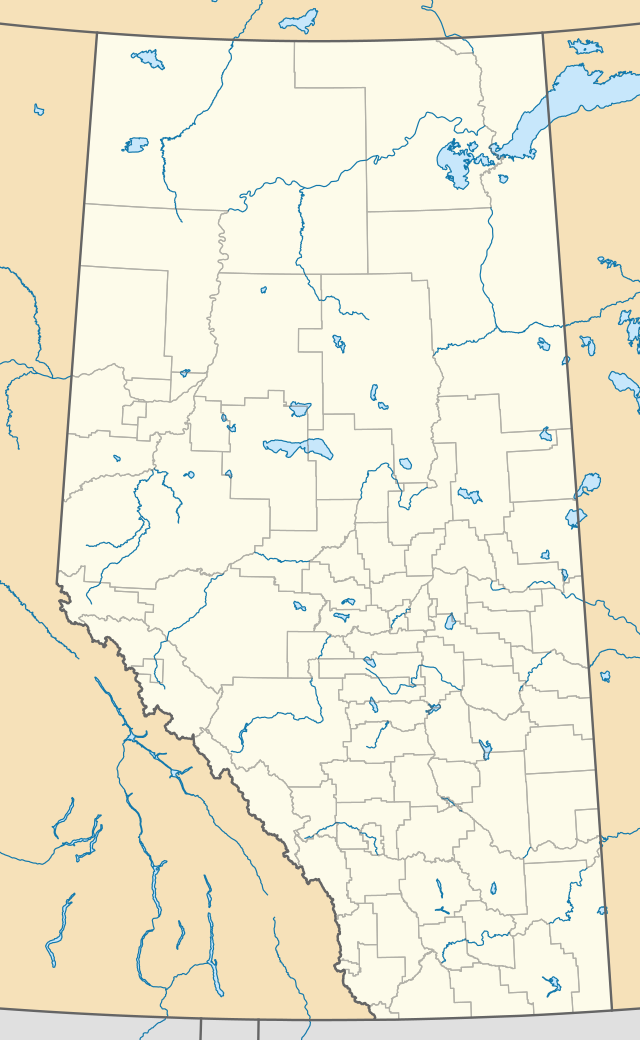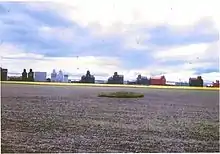Vulcan, Alberta
Vulcan is a town in the Canadian Prairies of southern Alberta, Canada, within Vulcan County. It is located on Highway 23, midway between the cities of Calgary and Lethbridge. The population of the town was 1,917 in 2016.[3] Now known as the "Official Star Trek Capital of Canada", Vulcan has a tourism building made to look like a landed space station, a statue of the original series Enterprise, and other Star Trek themed attractions.
Vulcan | |
|---|---|
Town | |
| Town of Vulcan | |
 Tourism and Trek Station | |
 Vulcan Location of Vulcan  Vulcan Vulcan (Canada) | |
| Coordinates: 50°24′24″N 113°15′18″W | |
| Country | Canada |
| Province | Alberta |
| Region | Southern Alberta |
| Census division | 5 |
| Municipal district | Vulcan County |
| Incorporated[1] | |
| • Village | December 23, 1912 |
| • Town | June 15, 1921 |
| Government | |
| • Mayor | Quinn Demers |
| • Governing body | Vulcan Town Council |
| • MP | Martin Shields (Bow River-Cons) |
| • MLA | Dave Schneider (Little Bow-UCP) |
| Area (2016)[3] | |
| • Land | 6.34 km2 (2.45 sq mi) |
| Elevation | 1,049 m (3,442 ft) |
| Population (2016)[3] | |
| • Total | 1,917 |
| • Density | 302.3/km2 (783/sq mi) |
| Time zone | UTC−07:00 (MST) |
| • Summer (DST) | UTC−06:00 (MDT) |
| Postal code span | T0L 2B0 |
| Area codes | +1-403, +1-587 |
| Highways | Highway 23 Highway 534 |
| Railways | Canadian Pacific Railway |
| Website | Official website |
History

Vulcan was named by a surveyor for the Canadian Pacific Railway after the Roman God of Fire – Vulcan. Originally, all the streets of Vulcan were named after gods and goddesses of the classical world such as Juno, Mars, and Jupiter.
The community was incorporated as a village on December 23, 1912 and then as a town on June 15, 1921.[5] In July 1927, a major tornado destroyed many homes and the new curling rink in the town. That tornado was made famous when a photograph of it approaching Vulcan was used for the "tornado" article in Encyclopædia Britannica.
The first newspaper to serve the area was the Vulcan Review, which began in 1912[6] and was published for one year. The Vulcan Review was followed by the Vulcan Advocate in 1913, which is still being published today[7] as member of Sun Media Community Newspapers part of Postmedia Network.

Vulcan once had nine grain elevators, more than any other location west of Winnipeg, making it the largest grain shipping point at that time. Due to the changing economics of the agricultural industry, the original elevators were taken down one by one. Today, Vulcan has only one of the "prairie skyscrapers" left that once could be seen miles away. Although not original, this last wooden elevator was built in the 1980s.
A British Commonwealth Air Training Plan air force base, RCAF Station Vulcan, was located 5.7 nautical miles (10.6 km; 6.6 mi) southwest[8] of the town during the Second World War. Many of the old hangars still exist and the runways can still be seen. It is now operated as Vulcan/Kirkcaldy Aerodrome and some of the old runways are still in use. There is a second airport, Vulcan Airport.
In 2015 the town council voted to form Heritage Advisory Board Committee to manage the historical sites in Vulcan County.[9]
Demographics

In the 2016 Census of Population conducted by Statistics Canada, the Town of Vulcan recorded a population of 1,917 living in 829 of its 879 total private dwellings, a 4.4% change from its 2011 population of 1,836. With a land area of 6.34 km2 (2.45 sq mi), it had a population density of 302.4/km2 (783.1/sq mi) in 2016.[3]
In the 2011 Census, the Town of Vulcan had a population of 1,836 living in 768 of its 865 total dwellings, a −5.4% change from its 2006 population of 1,940. With a land area of 6.58 km2 (2.54 sq mi), it had a population density of 279.0/km2 (722.7/sq mi) in 2011.[10]

Economy
The town's economy is mainly tourism and agriculture-based. Wheat, canola and barley are the main crops grown in the Vulcan area.
Tourism
Since 1990, Vulcan has hosted the annual Vulcan Tinman Triathlon, which takes place at the beginning of June. This sprint-distance triathlon attracts nearly 1,000 participants.[12] There are classes for adults of all ages and skill levels as well as for teams and children.
The town's name has brought some attention that has helped it become a tourist attraction.[13][14] In the Star Trek television and feature film series it is the name of the homeworld of Mr. Spock and his fellow Vulcans. Capitalizing on this coincidence, the town has built a Star Trek–themed tourist station (the Tourism and Trek Station), which provides tourist information, displays Star Trek memorabilia, provides unique photo opportunities, and allows visitors to participate in The Vulcan Space Adventure virtual reality game. Nearby, a replica of the starship Enterprise from Star Trek V has been mounted on a pedestal which includes writing from Star Trek alien languages such as Klingon.
The town has also created space-themed murals and signs, and hosts an annual community-wide Star Trek convention known as "Spock Days". This convention attracts hundreds of Star Trek fans from around the world.[13]
Infrastructure
Vulcan Community Healthcare Centre
The Vulcan Community Healthcare Centre offers emergency and long-term care medical services. The hospital had 5,125 visits for emergency medical services in the 2013/2014 year. It has eight medical beds with 15 long-term care beds and hosts a medical clinic.[15]
Geography
Climate
Vulcan experiences a dry continental climate (Köppen climate classification Dfb) with long, cold winters and short, warm summers.
| Climate data for Vulcan Canadian Climate Normals 1981-2010 Station Data | |||||||||||||
|---|---|---|---|---|---|---|---|---|---|---|---|---|---|
| Month | Jan | Feb | Mar | Apr | May | Jun | Jul | Aug | Sep | Oct | Nov | Dec | Year |
| Record high °C (°F) | 15.0 (59.0) |
23.0 (73.4) |
20.0 (68.0) |
29.0 (84.2) |
33.0 (91.4) |
33.0 (91.4) |
36.1 (97.0) |
35.5 (95.9) |
35.0 (95.0) |
30.5 (86.9) |
22.8 (73.0) |
19.0 (66.2) |
36.1 (97.0) |
| Average high °C (°F) | −3.1 (26.4) |
0.5 (32.9) |
5.3 (41.5) |
12.4 (54.3) |
17.5 (63.5) |
21.5 (70.7) |
24.5 (76.1) |
25.0 (77.0) |
19.1 (66.4) |
12.7 (54.9) |
2.8 (37.0) |
−2.2 (28.0) |
11.3 (52.3) |
| Daily mean °C (°F) | −8.8 (16.2) |
−5.6 (21.9) |
−0.7 (30.7) |
5.3 (41.5) |
10.5 (50.9) |
14.6 (58.3) |
17.0 (62.6) |
17.1 (62.8) |
11.7 (53.1) |
5.9 (42.6) |
−2.7 (27.1) |
−7.8 (18.0) |
4.7 (40.5) |
| Average low °C (°F) | −14.4 (6.1) |
−11.6 (11.1) |
−6.7 (19.9) |
−1.8 (28.8) |
3.4 (38.1) |
7.6 (45.7) |
9.6 (49.3) |
9.2 (48.6) |
4.2 (39.6) |
−1.0 (30.2) |
−8.1 (17.4) |
−13.3 (8.1) |
−1.9 (28.6) |
| Record low °C (°F) | −37.5 (−35.5) |
−37.0 (−34.6) |
−31.5 (−24.7) |
−20.6 (−5.1) |
−6.0 (21.2) |
−1.5 (29.3) |
2.0 (35.6) |
−2.0 (28.4) |
−9.0 (15.8) |
−26.0 (−14.8) |
−35.0 (−31.0) |
−38.3 (−36.9) |
−38.3 (−36.9) |
| Average precipitation mm (inches) | 13.1 (0.52) |
12.4 (0.49) |
21.2 (0.83) |
22.9 (0.90) |
64.4 (2.54) |
74.6 (2.94) |
59.7 (2.35) |
49.0 (1.93) |
44.6 (1.76) |
17.1 (0.67) |
17.7 (0.70) |
18.1 (0.71) |
414.8 (16.33) |
| Average rainfall mm (inches) | 0.0 (0.0) |
0.1 (0.00) |
0.8 (0.03) |
10.4 (0.41) |
57.4 (2.26) |
74.6 (2.94) |
59.7 (2.35) |
48.4 (1.91) |
39.9 (1.57) |
6.7 (0.26) |
0.9 (0.04) |
0.3 (0.01) |
299.1 (11.78) |
| Average snowfall cm (inches) | 13.1 (5.2) |
12.3 (4.8) |
20.4 (8.0) |
12.5 (4.9) |
7.0 (2.8) |
0.0 (0.0) |
0.0 (0.0) |
0.6 (0.2) |
4.7 (1.9) |
10.4 (4.1) |
16.8 (6.6) |
17.9 (7.0) |
115.6 (45.5) |
| Average precipitation days (≥ 0.2 mm) | 6.5 | 5.7 | 7.6 | 6.5 | 9.9 | 11.5 | 9.8 | 8.1 | 7.4 | 5.4 | 6.5 | 6.3 | 91.1 |
| Average rainy days (≥ 0.2 mm) | 0.0 | 0.2 | 0.7 | 3.8 | 9.3 | 11.5 | 9.8 | 8.0 | 6.7 | 2.7 | 0.4 | 0.3 | 53.4 |
| Average snowy days (≥ 0.2 cm) | 6.5 | 5.6 | 6.9 | 3.1 | 1.1 | 0.0 | 0.0 | 0.2 | 0.9 | 3.0 | 6.2 | 6.1 | 39.5 |
| Source: Environment and Climate Change Canada[16] | |||||||||||||
References
- "Location and History Profile: Town of Vulcan" (PDF). Alberta Municipal Affairs. October 7, 2016. p. 716. Retrieved October 13, 2016.
- "Municipal Officials Search". Alberta Municipal Affairs. September 22, 2017. Retrieved September 25, 2017.
- "Population and dwelling counts, for Canada, provinces and territories, and census subdivisions (municipalities), 2016 and 2011 censuses – 100% data (Alberta)". Statistics Canada. February 8, 2017. Retrieved February 8, 2017.
- "Alberta Private Sewage Systems 2009 Standard of Practice Handbook: Appendix A.3 Alberta Design Data (A.3.A. Alberta Climate Design Data by Town)" (PDF) (PDF). Safety Codes Council. January 2012. pp. 212–215 (PDF pages 226–229). Retrieved October 9, 2013.
- "Location and History Profile: Town of Vulcan". Alberta Municipal Affairs. May 5, 2015. Retrieved May 7, 2015.
- "Vulcan Review". Internet Archive. March 19, 1912. Retrieved January 25, 2020.
- "The Vulcan Advocate". Retrieved January 25, 2020.
- Canada Flight Supplement. Effective 0901Z 16 July 2020 to 0901Z 10 September 2020.
- "Preserving Vulcan's heritage". The Vulcan Advocate. April 24, 2015. Retrieved January 25, 2020.
- "Population and dwelling counts, for Canada, provinces and territories, and census subdivisions (municipalities), 2011 and 2006 censuses (Alberta)". Statistics Canada. February 8, 2012. Retrieved February 8, 2012.
- "Archived copy". Archived from the original on July 2, 2010. Retrieved July 29, 2010.CS1 maint: archived copy as title (link)
- The Vulcan Tinman Triathlon. "The Vulcan Tinman Triathlon: History". The Vulcan Tinman Triathlon. Retrieved February 2, 2018.
- Pawlowski, A. (August 22, 2013). "Live long and prosper in Vulcan, the 'Star Trek Capital of Canada'". NBC News. Retrieved August 22, 2013.
- Cernetig, Miro (September 8, 1990). "Small Town Ties Spacey Idea: Vulcan turns to 'Star Trek' to boost image". The Globe and Mail.
- http://www.vulcanbusiness.ca/residents/health/
- "Canadian Climate Normals 1981-2010 Station Data". Environment and Climate Change Canada. Retrieved August 21, 2019.
External links
| Wikimedia Commons has media related to Vulcan, Alberta. |
- Official website

- Digitized issues of the Vulcan Review and Vulcan Advocate newspapers from 1912 - 1967 in the Internet Archive.